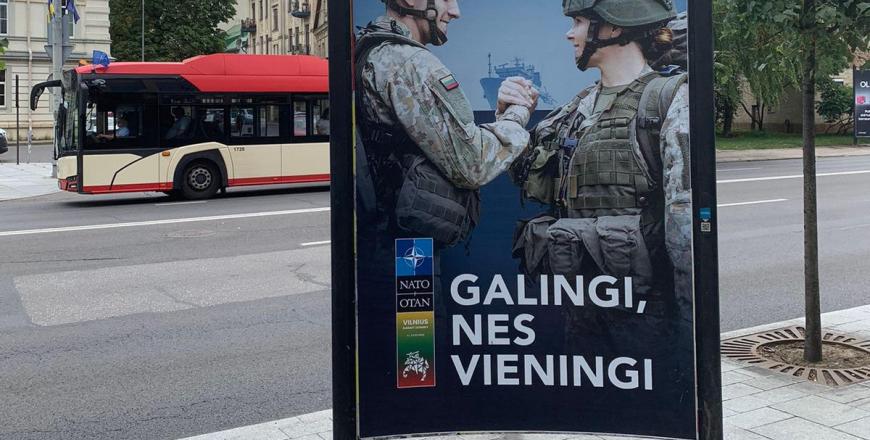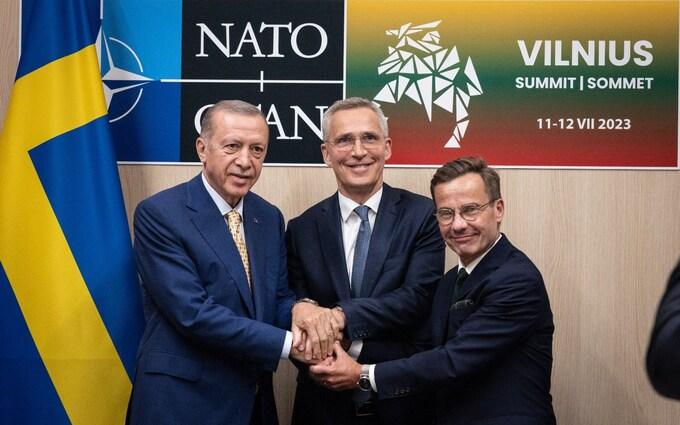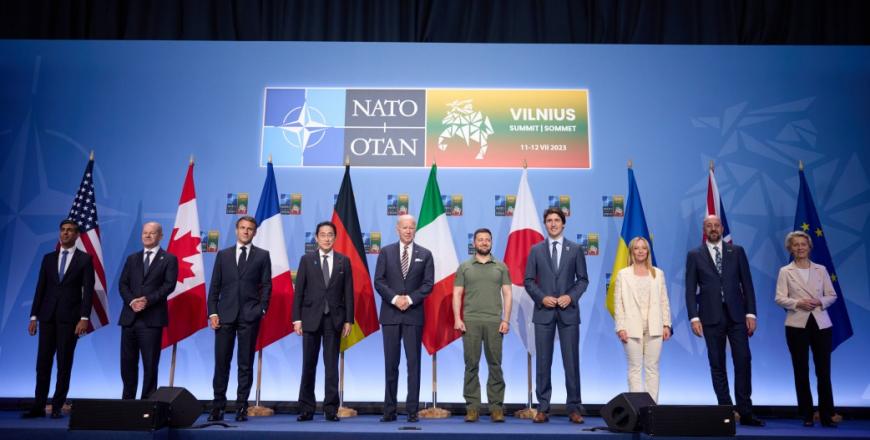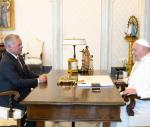You are here
Ukrainian question weighs heavy as Lithuania prepares to host NATO summit
By Mohammad Ghazal - Jul 10,2023 - Last updated at Jul 11,2023

VILNIUS — In the shadow of a sign proudly declaring, "We are very powerful because we are together", Vilnius, the charming capital city of Lithuania, sits abuzz with anticipation. The city's streets are decked out in a vibrant display of flags representing the NATO member states, ready for the alliance’s two-day summit beginning Tuesday.
The location of the summit itself is a powerful symbol: Vilnius is only 32 kilometres away from Lithuania's razor-wire topped border fence with Belarus, a Russian ally. This year marks the 700th anniversary of the city, a milestone the Lithuanian Foreign Ministry dubbed a celebration of "seven centuries of courage, growth and resilience".
"This NATO Vilnius Summit will be a historic moment for Lithuania and for the city," a statement from the foreign ministry read. "We expect the summit to be historic for the alliance as well. Not only because of being the summit held furthest to the Eastern NATO borders, but also because of the decisions that will contribute to the growth and strength of the alliance."
On the cusp of this monumental event, locals expressed their hopes and fears candidly.
Raimondas, a 65-year-old Lithuanian, voiced his desire for Ukraine's inclusion in the alliance, sharing distressing images and stories of Ukrainian villages.
"In the 21st century, it is crazy to see Ukraine, our neighbour, suffering. We think if Ukraine is a member, it is safe for all of us," he insists.
“We want peace and stability, but we also want more work together so we can face any common challenges with firmness and power,” he told The Jordan Times.
Emilija, a 14-year-old resident, voiced her sentiments, expressing her simple wish for a safe and peaceful world. "I hope that we live together in peace and security," she said.
“Of course, I am afraid; I have friends and relatives in Ukraine. I want a safe future for our generation,” Emilija added.
The alliance leaders, including US President Joe Biden, will meet just 151km from Russia itself. A contingent of approximately 1,000 troops from 16 NATO allies have been deployed to safeguard the summit, contributing the advanced air defence systems lacking in the Baltic states.
The situation in Ukraine, NATO’s further strengthening of its collective deterrence and defence posture, NATO’s partnerships with MENA partners and Indo-Pacific partners and NATO’s practical support to specific partners, including Ukraine, Moldova, Georgia and Bosnia and Herzegovina, will feature high on the summit’s agenda.
According to NATO, one of the key issues set to dominate the summit is Ukraine's fate amid Russia's invasion and its NATO membership application. Ukrainian President Volodymyr Zelenskyy is expected to make a powerful appeal for Ukraine's inclusion once the war is over. Measures to strengthen political ties, offer long-term support and set up a NATO-Ukraine Council are among the likely responses.
NATO leaders will also have to resolve internal squabbling, with issues like Turkey’s reluctance to approve Sweden’s membership on the table.
Hosting the summit is a matter of great pride for Lithuania. The event is being held at LITEXPO – the Lithuanian Exhibition and Congress Centre, and marks the most high-profile international event that Lithuania has hosted since it joined the alliance in 2004.
“I expect allied leaders will agree to a package with three elements, to bring Ukraine closer to NATO,” said NATO Secretary-General Jens Stoltenberg in a recent press statement, a copy of which was obtained by The Jordan Times.
The package will include a multi-year programme of assistance to ensure interoperability; upgraded political ties — with Zelenskyy attending the inaugural meeting of a new NATO-Ukraine Council; and a reaffirmation that Ukraine will become a member of NATO, with a unified vision on how to bring Ukraine closer to its goal.
Allies will also take major steps to strengthen deterrence and defence, with the adoption of three new regional defence plans to counter the two main threats to NATO: Russia and terrorism. The plans will be supported by 300,000 troops on higher readiness, including substantial air and naval combat power, NATO said.
Allies are also expected to endorse a Defence Production Action Plan to “aggregate demand, boost capacity, and increase interoperability” and a more ambitious defence investment pledge to invest a minimum of 2 per cent of Gross Domestic Product annually on defence.
The secretary-general welcomed NATO’s new defence spending estimates which show a real increase of 8.3 per cent for European allies and Canada in 2023.
"This is the biggest increase in decades, and the ninth consecutive year of increases in our defence spending," the secretary-general said. "So European allies and Canada will have invested over $450 billion extra since we agreed our defence investment pledge in 2014."
The leaders of Australia, New Zealand, Japan and South Korea, as well as the European Union, will also take part in the Vilnius Summit.
This will be Finland’s first summit as a NATO Ally, the secretary-general noted, adding: “We look forward to Sweden joining as soon as possible.”
Following a constructive meeting of senior officials from Turkey, Sweden and Finland on Thursday, Stoltenberg will meet with President Erdogan and Prime Minister Kristersson in Vilnius on July 10 as the next step, according to NATO.
Related Articles
VILNIUS— In a historic move, Turkey's President Recep Tayyip Erdogan has agreed to present Sweden's NATO membership bid to the Turkish parli
WASHINGTON — The United States won't make special arrangements for Ukraine to join the NATO military alliance, President Joe Biden said on S
VILNIUS- In a development that reassures Ukraine's security, President Joe Biden, on Wednesday, affirmed that the combined declaration of su

















